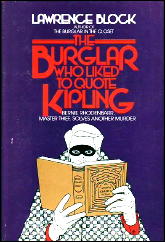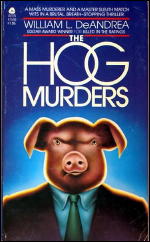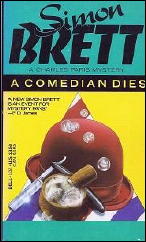Mon 21 Mar 2011
HERE COMES THE JUDGE: THE “NERO” AWARD, 1979, by Bill Crider.
Posted by Steve under Awards[11] Comments
by Bill Crider

The first annual “Nero” award, named for Nero Wolfe and given in honor of his creator, Rex Stout, was won by Lawrence Block for The Burglar Who Liked to Quote Kipling. The award, a replica of Wolfe’s famous gold bookmark, was presented at a Black Orchids Dinner, December 1, 1979, in New York City. The winner was chosen by a panel of judges named by the Stout fan club known as The Wolfe Pack.
This award was of special interest to me because I was one of the judges. I have no real idea why I was selected to serve, as I am not a member of the Wolfe Pack and I am hardly so deluded as to think that my reputation for criminous knowledge has spread even unto the Wolfe Pack hierarchy. But I have been corresponding with John McAleer, Stout’s biographer, for a number of years, and I even helped him a tiny bit in his researches. Maybe he wanted to do me a favor.
At any rate, I was told that I should try to judge the books I received by how well they carried on the tradition of Rex Stout. I took that to mean that I should look for a book that had some of the qualities of Stout’s work, rather than one that simply imitated the master. The catch was that publishers were asked to nominate books, and the judges could make their selections only from those books which the publishers nominated.
In a way, this made my job easier. Many publishers obviously had no idea about the tradition of Rex Stout, and I had to read only a few pages of the books to see that they wouldn’t do at all. Some of them I finished; others, I didn’t.

For example, Doubleday submitted, among others, Domino, by Phyllis A. Whitney. Now, some of my best friends like Phyllis A. Whitney, but a gothic set in Colorado is not my idea of a book which is in any way like anything Rex Stout wrote.
Lippincott sent The Green Ripper, which was not bad MacDonald but which wasn’t really even a mystery. (One of my criteria was that the book had to be a mystery, which eliminated not only MacDonald but such spy stories as Victor Canning’s Birdcage and Campbell Black’s Brainfire.)
Some of the actual mysteries eliminated themselves, like Stephen Greenleaf’s Grave Error, which was too slow and too much like Ross Macdonald. Then there was The Reggis Arms Caper by Ross Spencer, not a bad joke, but the joke’s getting a little thin.
What it boiled down to was that as far as I was concerned, there were only four real contenders in the group of books that I had to select from. I thought that since there were a number of other judges, there might have to a compromise. There might have been on the part of others, but my first choice was the winner, Block’s Burglar. Only the top prize was awarded, so my other choices weren’t really necessary.

I voted for Block’s book because I like the way he handles first person narration; while Bernie the burglar is no Archie, he’s pretty good. Besides, the book is a real mystery, in which the suspects are called together at the end. And the relationships among the characters are well done.
My second choice, I have to admit, was more obviously based on the Wolfe books. It was William DeAndrea’s The Hog Murders, an Avon paperback original. As DeAndrea is a member of The Wolfe Pack, it’s just as well he didn’t win; as some might have thought that the judging was rigged.
Other books that I considered in the running were Simon Brett’s A Comedian Dies and Marvin Kaye’s My Brother, the Druggist. These latter three, however, were my personal choices; I don’t know how the other judges felt about them.
Judging the award was an interesting experience, and I got a huge stack of free books for my shelves. Apparently the Wolfe Pack was satisfied with the work of all the judges and may be using the same panel again for the 1980 award. That will be fine with me. I just can’t turn down a free copy of a good mystery. Or even a bad one.
The one thing I learned from my experience is that there is no one to replace Rex Stout. Nero and Archie are unique. We’ll never see their like again.
Coming soon to this blog:
Bill reviews The Hog Murders and My Brother, the Druggist.
THE NERO AWARD WINNERS:
* 1979 – The Burglar Who Liked to Quote Kipling by Lawrence Block
* 1980 – Burn This by Helen McCloy
* 1981 – Death in a Tenured Position by Amanda Cross
* 1982 – Past, Present and Murder by Hugh Pentecost
* 1983 – The Anodyne Necklace by Martha Grimes
* 1984 – Emily Dickinson is Dead by Jane Langton
* 1985 – Sleeping Dog by Dick Lochte
* 1986 – Murder in E Minor by Robert Goldsborough
* 1987 – The Corpse in Oozak’s Pond by Charlotte MacLeod
* 1988 – no award presented
* 1989 – no award presented
* 1990 – no award presented
* 1991 – Coyote Waits by Tony Hillerman
* 1992 – A Scandal in Belgravia by Robert Barnard
* 1993 – Booked To Die by John Dunning
* 1994 – Old Scores by Aaron Elkins
* 1995 – She Walks These Hills by Sharyn McCrumb
* 1996 – A Monstrous Regiment of Women by Laurie R. King
* 1997 – The Poet by Michael Connelly
* 1998 – Sacred by Dennis Lehane
* 1999 – The Bone Collector by Jeffery Deaver
* 2000 – Coyote Revenge by Fred Harris
* 2001 – Sugar House by Laura Lippman
* 2002 – The Deadhouse by Linda Fairstein
* 2003 – Winter and Night by S.J. Rozan
* 2004 – Fear Itself by Walter Mosley
* 2005 – The Enemy by Lee Child
* 2006 – Vanish by Tess Gerritsen
* 2007 – All Mortal Flesh by Julia Spencer-Fleming
* 2008 – Anatomy of Fear by Jonathan Santlofer
* 2009 – The Tenth Case by Joseph Teller
* 2010 – Faces of the Gone by Brad Parks
March 21st, 2011 at 2:15 pm
I’ve not read many of these books, the ones that won the award, but it seems to me that as the years have gone on, they’ve gotten farther and farther away from the Rex Stout tradition.
Or is it just me? (I’m willing to be convinced that it is.)
March 21st, 2011 at 4:20 pm
Or it has gotten harder to find a good one in “Rex Stout tradition” published.
March 21st, 2011 at 4:34 pm
Michael
That’s a good point. The thought had occurred to me too. It’s an explanation that fits, or it would be, if my observation is true.
The condition that the committee can select only from books submitted by the publishers themselves (and not the authors or the committee members) I’m sure still holds true, and I’m willing to wager that finding a publisher who knows what the Rex Stout tradition is is even harder to find than the books themselves.
According to the way Bill tells it, they didn’t even know in 1979.
I wonder if that’s why there was a stretch of three years in which no award was given.
LATER: It took some searching, but I finally found a page listing the various criteria for the Nero award:
http://www.nerowolfe.org/htm/neroaward/award_procedures.htm
# written in the tradition of Rex Stout’s Nero Wolfe stories
# first published in the year preceding the award year
# originally published in the United States
# submitted directly by the publisher
March 21st, 2011 at 8:41 pm
It should be noted that the Wolfe Pack did NOT pick the judges that first year, Mr. McAleer, who was the Award Chair, did the picking.
I would hope that Mr. Crider, and others reading this post, will join the Wolfe Pack, as dues are not expensive and members receive our journal and notices of our many events.
Each year about 50-55 books are submitted for the award. Mr. Crider is correct that publishers make the nominations and he is also correct that many do not meet the criteria established by the Wolfe Pack or are not in Rex Stout’s style. But as was also mentioned, there are fewer and fewer of this type of mystery novel being written.
I have not liked all of the winners, but then not everyone shares my taste.
I invite everyone to visit the Wolfe Pack’s web site: http://www.nerowolfe.org
Jonathan Levine
Werowance Emeritas
The Wolfe Pack
March 21st, 2011 at 8:59 pm
Thanks for the invite, Jonathan, and for stopping by!
— Steve
March 22nd, 2011 at 2:50 am
I suppose if you take a broad enough definition of the Rex Stout tradition to include his many works in the pulps you could work quite a few books of varying types into the mix.
To me the Stout tradition would go beyond the jaunty first person narration of Archie or the presence of the brilliant eccentric Nero Wolfe to include a sane, outspoken, liberal voice that is distinctly American and unafraid of being heard.
Though never strident or preachy with it Stout was a very political writer when you get down to it, patriotic, but far from blind to home grown problems.
Whether you agreed with him or not you couldn’t read a Stout novel without knowing what he thought, how he thought, and feeling the weight of his opinions. Granted all that took a backseat to entertainment, and not every Wolfe story, novella, or novel fits that description, but at least one thing that defined Stout’s fiction for me was saying what he thought and presenting his argument clearly, forcefully, and with very little room for misunderstanding.
To me Stout always represented a writer willing to speak up in times when it wasn’t always a popular thing to do and to speak to difficult truths when people — especially people reading escapism — might not always want to hear them.
That, and while you could be pretty sure that Archie, Wolfe, Fritz, Cramer, Saul, Theodore, Lon Cohen, and Purly Stebbins were safe, beyond them you never quite knew who was going to meet their end in a Wolfe novel. Over the years he surprised us on that count a few times.
March 22nd, 2011 at 7:23 am
I must admit I had no idea the “Nero” was still being awarded. That said, it would be hard to see how Connelly’s THE POET could fit in the “Stout tradition” at all. The same goes for a number of the titles that followed it.
March 22nd, 2011 at 9:08 am
Jeff
I haven’t read that one by Connelly but looking through the list of winners, the year that THE POET won the award, 1997, is the same demarcation line I was referring to in my Comment #1.
David
You’re absolutely right about Stout and his philosophy of politics, his sense of justice and his attitude toward life in general. As you say, you don’t notice it in every book and every story, but it’s the glue that holds the entire Wolfian saga together.
— Steve
March 22nd, 2011 at 11:01 am
[…] Bill related in this earlier post, as a judge for the first “Nero” Award, The Hog Murders was one of three other books he […]
March 22nd, 2011 at 4:16 pm
Thank you, Mr. Levine. I did join.
March 25th, 2011 at 9:02 pm
[…] Bill related in this earlier post, as a judge for the first “Nero” Award, My Brother, the Druggist was one of three books […]